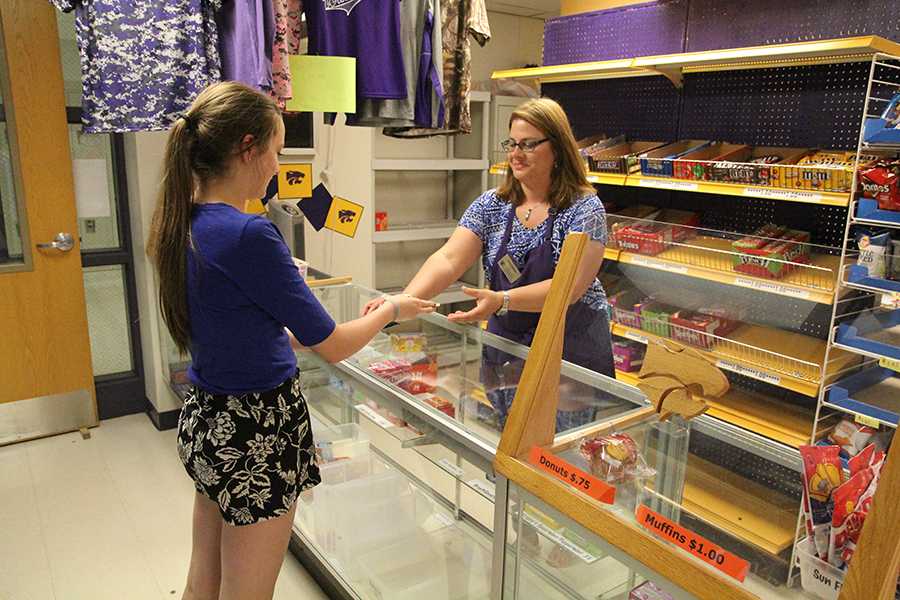Hand it over
New legislation means students can say good-bye to some favorite foods
Kaitlyn Puyear (9) purchases candy from Mrs. Laurie Forsythe in the school store, May 6. This option will not be available next year thanks to the Hunger-Free, Healthy Kids Act of 2010.
Bread Co. Bagels, candy from the school store, junk food from Coach Jason Conley’s table, ice cream, the vending machines and chips from the lunch line.
What all theses items have in common is that none of them will be here next year, or for that matter, at any school.
“I don’t really mind the vending machines going because I don’t really buy from those, but I’m really going to miss the StuCo bagels,” Ashley Jaspers (9) said.
But next year students won’t be finding those bagels at the StuCo table, and no one at Eureka can be blamed.
The Healthy, Hunger Free Kids Act of 2010 has forced the removal of competitive foods from schools across the nation. A competitive food is anything that doesn’t meet government standards and/or competes with the standard lunch sold by public school cafeterias.
The bagels may pass regulations, but the time they are sold creates conflict.
Food items sold from midnight to 6 p.m. can only be sold through the cafeteria. For example: A student can buy soda at a football game, but a student cannot buy that soda from the school stores as it conflicts with school lunches.
“The people who are making the decisions are so far removed from a school building and from life in a school building that in their efforts to do what they believe is right for the general well-being and health of our students they are in the same breath making it very difficult to provide the resources that our schools have come to expect,” Mrs. Jennifer Strauser, associate principal, said.
This issue brings to light how much input the government has over all aspects of public schooling.
“I think the government is kind of going out of their way to do something that’s probably not going to fix anything,” Alec Lang (11) said.
There is also the concern over students’ choices being stripped.
“I believe that it is the consumer’s choice as to whether they eat healthy and not the government’s choice to force us what to eat,” Will Henderson (10) said.
That’s another worry about the major change: how much school will be affected by the financial loss.
“I don’t know what kind of impact we are going to have,” Mrs. Carmen Fischer, head of Child Nutrition Services, said. “I don’t know if students will perhaps choose more entrees.”
However, this may not be the case. “I think I will definitely start to bring in my own food because everyone needs some sweets,” Henderson said.
There really is no way to know if the loss of bagels sales will cause financial strain for StuCo or if an alternative method of fundraising will be implemented.
The school store is also taking a hit. Sixteen thousand dollars of the PTO’s annual $30,000 budget comes from food sales at the school store, according to the Co-President of PTO, Mrs. Nancy Leonard.
“We support a lot of programs like Staff Appreciation, Senior Celebration, Renaissance, e!Crew,” Mrs. Leonard said. “We do those dinners for the teachers twice a year. I honestly don’t know what we are going to do without just over half of our income for the year.”
Despite strict regulations, Rockwood is making sure that some favorite lunch-time snacks are not lost.
“We are going to be meeting with Smoothie King next week to determine a recipe that, kind of meet up with them to come up with a smoothie that meets qualifications,” Mrs. Fischer said.
For students who bring their own foods, not much is changing. Caffeine is still allowed (at the high school at least), and students still have the right to bring in foods from home.
“If we choose not to buy it at school because we are not allowed to, that doesn’t stop anyone from going home after school after a certain activity and having junk food,” Ryan Giesing (9) said.
Grace Herrick (9) would take the regulations a step further.
“I don’t think they should have pizza,” Herrick said. “I just don’t think it’s a healthy part of Americans’ diets.”
But the change isn’t as drastic as it could be. Rockwood has been working on implementing changes since 2001.
The fact that there was a time when fries were offered every day, and non Coke Zero products were offered now seems unfathomable.
To the kindergarteners of today, the fact that Coke Zero products and cookies were once served here could seem just as far fetched.
Your donation will support the student journalists of Eureka High School - MO. Your contribution will allow us to purchase equipment and cover our annual website hosting costs.




















